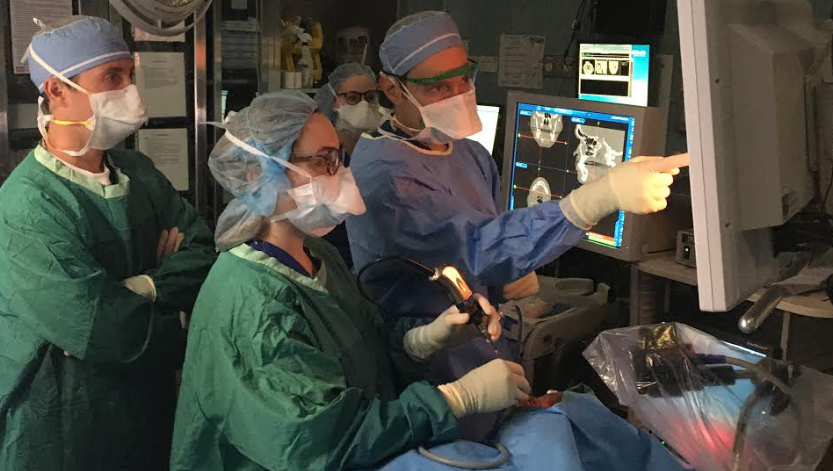Family Otolaryngology Care: What Parents Should Know
Family Otolaryngology Care: What Parents Should Know
Blog Article
Checking out the Area of Otolaryngology: What to Expect When You Seek Advice From an ENT
Otolaryngology, frequently referred to as ENT, includes the diagnosis and therapy of ear, throat, and nose disorders. For those experiencing related issues, speaking with an ENT expert can offer clarity and relief. Understanding what to expect during such consultations is essential for effective interaction and treatment. This introduction will outline essential aspects of the ENT experience, consisting of usual reasons for sees and the processes involved in medical diagnosis and therapy.

Recognizing Otolaryngology: A Summary
Otolaryngology, typically described as ENT (Ear, throat, and nose) medication, is a specific branch of medication that concentrates on the medical diagnosis and treatment of problems influencing these crucial areas of the human body. This area incorporates a large range of problems, consisting of those related to hearing, balance, respiratory system feature, and speech. Otolaryngologists are educated to manage both surgical and clinical treatments, utilizing advanced methods and modern technologies. Their know-how prolongs past traditional ailments, addressing concerns such as allergic reactions, sinus infections, and hearing loss. In addition, they play an important function in the monitoring of head and neck cancers cells, supplying thorough treatment tailored to individual client requirements. Generally, otolaryngology remains important for maintaining wellness and lifestyle in affected people.
Typical Factors to See an ENT Expert
Many individuals seek the experience of an ENT specialist for a variety of factors, mirroring the varied nature of problems that influence the ear, throat, and nose. Usual issues consist of chronic sinus problems, which commonly brings about relentless nasal congestion and facial pain. Allergies and their associated symptoms, such as itching and sneezing, also motivate check outs to these specialists (ENT Doctor). Hearing loss, whether steady or abrupt, is another substantial factor for appointment. Additionally, people might look for analysis for throat disorders, consisting of consistent hoarseness or ingesting troubles. Rest apnea, defined by disrupted breathing during rest, is regularly attended to by ENT experts. Each of these problems highlights the significance of specialized care in taking care of complex ENT-related health issues
Planning for Your ENT Visit
When preparing for an ENT visit, it is vital to collect appropriate details and consider any specific worries. Patients must compile an in-depth case history, consisting of previous ear, nose, or throat problems, surgeries, and present drugs. Recording signs and symptoms-- such as intensity, period, and regularity-- can give valuable insights for the ENT specialist. Additionally, people should prepare a listing of concerns they want to ask, guaranteeing that all worries are attended to during the see. Bringing along any type of appropriate medical records or examination results can additionally assist the ENT in comprehending the client's condition. Lastly, people must confirm their consultation information, consisting of day, area, and time, to lessen any kind of last-minute confusion. Proper prep work can improve the effectiveness of the examination and bring about far better results.
What to Anticipate Throughout the Appointment
As the assessment starts, the individual can anticipate to participate in a detailed conversation with the ENT professional concerning their signs and medical background. The specialist will ask about the duration, frequency, and extent of symptoms such as hearing loss, nasal congestion, or sore throat. In addition, the client's previous clinical problems, medicines, and any type of relevant family background will certainly be evaluated, helping the professional in creating a full understanding of the patient's health. The ENT may additionally inquire about way of living aspects, such as here direct exposure to toxic irritants or allergens. This open discussion develops a structure for the consultation, making certain that the person's problems are resolved and setting the stage for any type of required assessments or referrals for treatment.
Diagnostic Examinations and Treatments in Otolaryngology
A variety of diagnostic examinations and procedures are crucial in otolaryngology to precisely review and detect conditions affecting the ear, throat, and nose. Usual examinations consist of audiometry, which gauges hearing function, and tympanometry, examining center ear stress. Nasal endoscopy permits visualization of the nasal flows and sinuses, while laryngoscopy examines the throat and singing cords. Imaging methods, such as CT scans and MRIs, offer in-depth views of head and neck structures. Allergic reaction screening might likewise be carried out to recognize triggers for sinus or respiratory problems. These diagnostic devices allow ENT experts to develop a thorough understanding of clients' conditions, making certain tailored and reliable monitoring strategies. Appropriate diagnosis is crucial for effective treatment results in otolaryngology.
Therapy Alternatives Offered by ENT Specialists
ENT specialists offer a range of therapy choices tailored to resolve particular conditions affecting the ear, throat, and nose. These therapies range from conservative strategies, such as medicine and lifestyle adjustments, to even more invasive procedures. For instance, allergic reactions might be taken care of with antihistamines or immunotherapy, while chronic sinusitis could need nasal corticosteroids or sinus surgery. For hearing loss, ENT specialists frequently recommend listening device or medical interventions like cochlear implants. In cases of throat conditions, choices can consist of speech therapy or surgical procedures to get rid of obstructions. In addition, they might give assistance for managing rest apnea, consisting of making use of CPAP tools or medical interventions. On the whole, the goal is to boost clients' top quality of life via personalized treatment and reliable therapy techniques.
When to Seek Follow-Up Care With an ENT
When to seek follow-up care with an ENT specialist is vital for taking care of recurring signs or issues related to throat, ear, and nose problems, identifying. Individuals must think about scheduling a follow-up consultation if signs continue in spite of preliminary treatment, such as chronic ear pain, nasal blockage, or throat pain. Modifications in hearing, equilibrium issues, or uncommon nasal discharge may likewise warrant further assessment. In addition, if an individual experiences side results from recommended drugs or has actually gone through an operation, follow-up treatment is essential to keep track of recovery and resolve any type of concerns. Prompt examinations can assure reliable management of problems, avoid potential problems, and give tranquility of mind relating to one's health and wellness. Seeking follow-up treatment promotes aggressive health administration in otolaryngology.
Regularly Asked Questions

What Certifications Should I Try to find in an ENT Specialist?
When seeking an ENT professional, one should seek board certification, relevant experience, and strong client evaluations. Additionally, reliable interaction skills and a thoughtful approach can significantly improve the general therapy experience.
Exactly how Do I Choose the Right ENT for My Needs?
Selecting the appropriate ENT professional includes examining their qualifications, experience, and client testimonials (Hearing). It is vital to consider their interaction style and approach to treatment, ensuring they straighten with the person's particular health requirements and preferences
Exist Any Risks Connected With ENT Procedures?
The risks associated with ENT treatments may consist of infection, blood loss, anesthetic issues, and potential damage to bordering frameworks. Patients ought to review these risks with their doctor to recognize individual issues and guarantee educated decisions.
How Can I Handle Stress And Anxiety Before My ENT Appointment?
To handle anxiety prior to an appointment, people can exercise deep breathing exercises, envision favorable outcomes, prepare questions ahead of time, and seek support from close friends or family, fostering a sense of confidence and peace.
What Should I Do if I Experience Negative Effects From Therapy?
If adverse effects from therapy occur, the individual needs to without delay report them to their doctor. Changes to treatment or added interventions might be necessary to assure security and effectiveness in managing their condition - ENT Clinic. As the appointment starts, the person can expect to involve in a comprehensive discussion with the ENT specialist regarding their signs and clinical history. These diagnostic tools allow ENT specialists to establish a complete understanding of clients' problems, making certain customized and effective management strategies. ENT experts supply a range of treatment options customized to address certain problems affecting the ear, nose, and throat. When looking for an ENT expert, one must look for board certification, appropriate experience, and solid individual testimonials. Picking the right ENT professional involves reviewing their certifications, experience, and client evaluations
Report this page